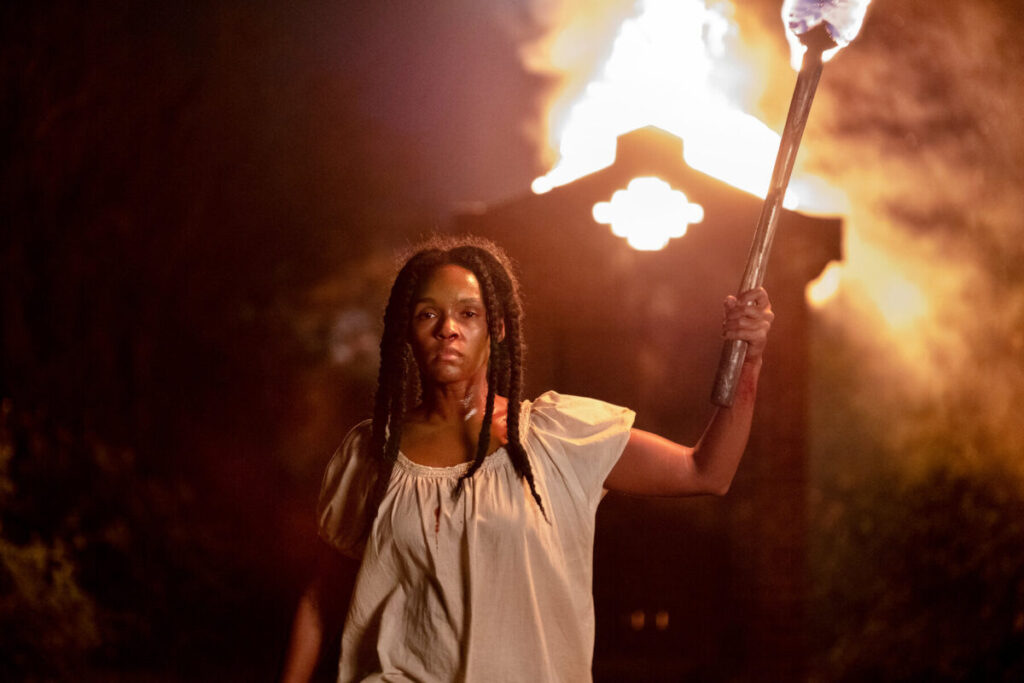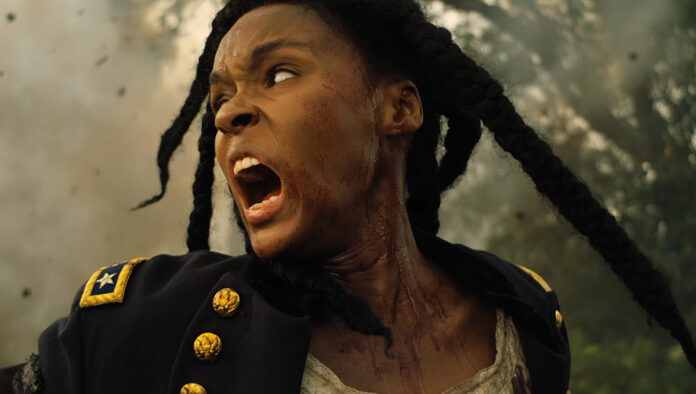An Antebellum Movie Review for White People (Especially White Movie Reviewers)
I have a deep love for horror movies, so when the advertisements for “Antebellum” came out what feels like years ago, I couldn’t wait to hit the movie theaters to see it. Well, 2020 had other things in mind for all of us obviously. So, the minute “Antebellum” came out for rent, I dropped the cash to see it fast. I was not disappointed. At all.
Imagine my surprise as I hopped online to read the “Antebellum” movie reviews that other sites were posting. Across the board, they were fairly bad–and largely written by white people. So, why is this relevant?
In notes to the press, debut director Gerard Bush says “Antebellum’s” goal was “to force the audience to look at the real-life horror of racism through the lens of film horror.” The movie is categorized as a neo-horror movie and addresses slavery and the toxicity and persistence of racism in America through a story line that oscillates from past to present. The lead female protagonist, played by Janelle Monáe, finds herself first living as a slave named Eden on a plantation during the Civil War era and then later in the film wakes up in modern times as Veronica, a famous author, sociologist, wife and mom; leaving the audience to wonder how she gets from here to there.
Kicking off with a Faulkner quote appearing across a dark screen: “The past is never dead. It’s not even past”, “Antebellum” launches into brutal scenes on a plantation that include the murder and rape of women. We meet Eden right away who is being brought back to her cabin by a white man who owns her after an attempted escape. After refusing to say her name (one that was given to her while in slavery) he brands her.
When the movie flashes to modern times, we find out the Eden is actually Veronica who is a famous, well off and powerful Black woman. The rest of the movie is spent unraveling the mystery of how Veronica ends up becoming Eden, as well as how Black people are being pulled from the present to be enslaved in the past. I’ll leave that out to avoid spoiling it for you.
As the movie progresses, the message becomes clear: as we are learning while living in America during the racism of the trump presidency, the past is not the past. As a white person, I felt a deeper understanding of what this truly means for Black people. How they must feel only a short stumble away from the atrocities their ancestors experienced. How they must feel knowing that there are white people who would gladly bring them back in time to that era if only they could. Think: Proud Boys, White Nationalists, KKK…shall I go on? It’s truly terrifying.
So when the likes very white Mr. Sims at the Atlantic writes, “Antebellum isn’t just bad—it’s vile. To make a point about the evils of white supremacy, the film subjects its Black characters to unceasing brutality,” I have to wonder what the fuck the Atlantic was thinking having this guy do the movie review! Are you kidding me? I mean…slavery is all about unceasing brutality you ass clown! Slavery was (is) vile!
And oh how I cringed when I read the “Antebellum” movie review by the epitome of the cliche “blonde white woman” Christy Lemire who refers to Eden’s slave story line as “trite and cliched…”, and then tries to kiss Monae’s ass by going on and on about how wonderful she is only to say, “she can only do so much when there’s so little to her character between the extremes of endless victimization and empty platitudes of empowerment.” I want to grab Lemire by her ears and shout, “But that’s the point bitch!” That’s the plight of the Black woman! At least as far as I can understand it at this point…and trust me, I get that I don’t understand. And that’s exactly why this film is good: I now have a better understanding.

But that isn’t the the worst of it. Lemire’s brief summary of the film was truly jaw-dropping. She writes that it leaves an “icky” taste in your mouth. Yes, really. Her take is, “Antebellum is dazzling to the eyes, it also leaves an icky taste in your mouth in its leering, exploitative depiction of violent, slavery movie tropes.”
Dear white reviewers and viewers, for the first time ever, horror movies are being made by Black artists. They are telling stories from the Black perspective, experience, and historical point of view. Just because it doesn’t match your white understanding of or view of the world, history, or reality doesn’t make it bad. If you find yourself with an “icky taste in your mouth” after watching “Antebellum” it might actually be you that is the problem…not the movie.
One thing all of the reviews did agree on (including mine) is that “Antebellum’s” cinematography is stunning. I can’t help but be a bit disappointed about not having first seen it on the big screen. The vivid beauty of each shot combined the real horrors being depicted is simultaneously captivating and sickeningly jarring as it forces the audience experiences the actual horrors of slave life on the plantation from the protagonist’s perspective in full color. Each time Eden (or one of the other Black characters) is assaulted, so is the audience. And so the horror sets in.
What would YOU (white viewer) do if you were in this situation? How would YOU (white viewer) feel? There’s something so deeply disturbing about watching a horror movie, that’s really just a depiction of something horrific that really happened–and that by the end makes you wonder if it could again.
Do your best to make sure it doesn’t and Vote.




